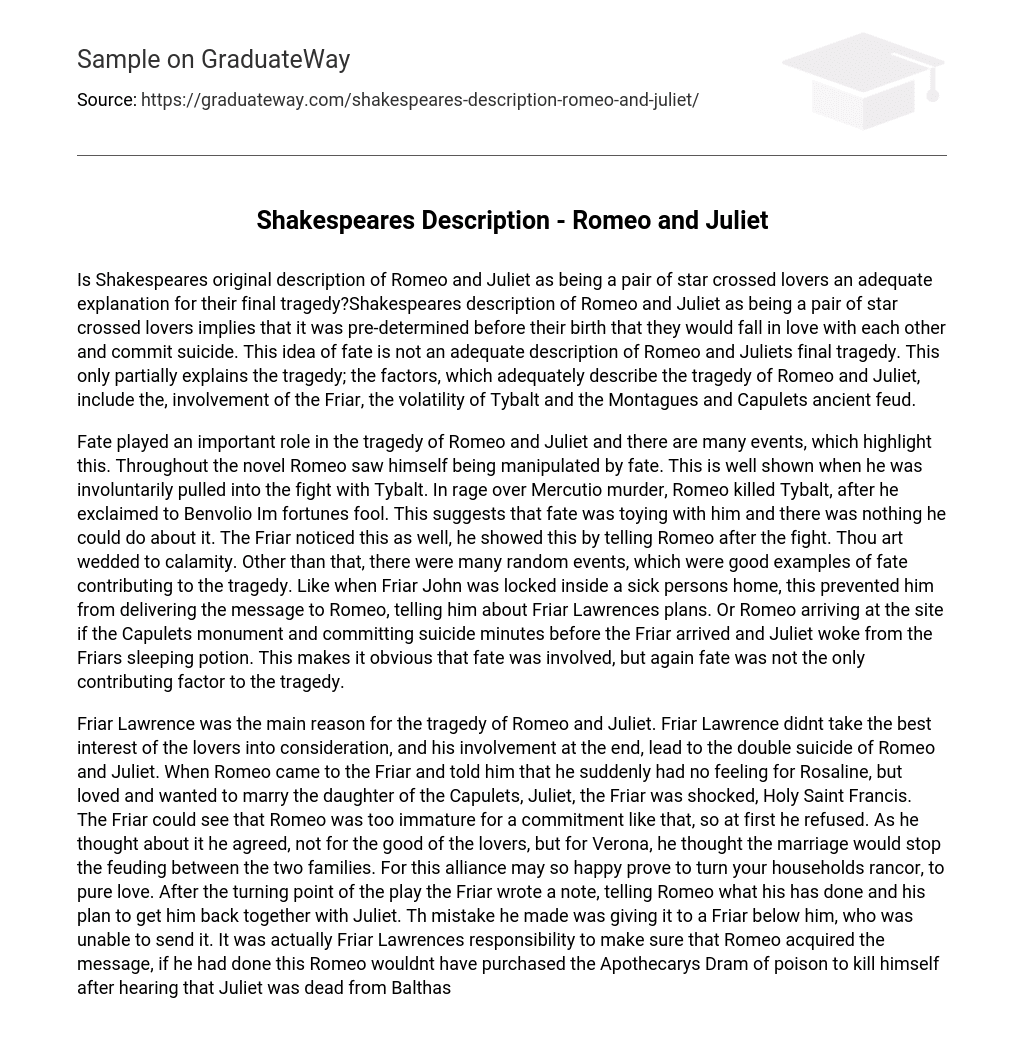Is Shakespeare’s original description of Romeo and Juliet as star-crossed lovers sufficient to explain their ultimate tragedy? Shakespeare’s portrayal of Romeo and Juliet as star-crossed lovers suggests that their love and ensuing suicide were predestined before their birth. However, this concept of fate alone does not fully explain the tragedy. The factors that truly elucidate Romeo and Juliet’s tragic tale include the intervention of the Friar, the goading nature of Tybalt, and the ancient rivalry between the Montagues and the Capulets.
The tragedy of Romeo and Juliet was heavily influenced by fate, as evident through various events in the story. Romeo felt as though he was being controlled by destiny, especially when he was unexpectedly drawn into a fight with Tybalt. Consumed with anger over Mercutio’s murder, Romeo exclaimed to Benvolio that he was merely a victim of misfortune. This implies that fate was playing with him, and he had no power to change it. The Friar also recognized this, expressing to Romeo after the altercation that he was destined for disaster. Furthermore, there were other unplanned incidents that exemplified fate’s contribution to the tragedy. For instance, when Friar John got trapped in a house of a sick person, he was unable to deliver the crucial message to Romeo regarding Friar Lawrence’s plans. Additionally, Romeo arrived at the Capulets’ monument and took his own life just moments before the Friar arrived and Juliet woke up from the sleeping potion. These occurrences make it evident that fate played a role; however, it should be noted that fate alone was not solely responsible for the tragedy.
Friar Lawrence was the primary cause of the tragedy in Romeo and Juliet. He neglected the best interests of the two lovers, ultimately leading to their double suicide. When Romeo confessed to the Friar that he no longer loved Rosaline but desired to marry Juliet, the Friar was astonished, exclaiming “Holy Saint Francis!” Recognizing Romeo’s immaturity, the Friar initially refused his request. However, he later agreed, not out of concern for the lovers, but because he believed their marriage would end the feud between their families. In a note written after a pivotal moment in the play, the Friar detailed his actions and his plan to reunite Romeo and Juliet, but mistakenly entrusted it to a subordinate who failed to deliver it. It was ultimately Friar Lawrence’s responsibility to ensure that Romeo received the message. Had he done so, Romeo would not have resorted to buying poison from the Apothecary and tragically taking his own life upon hearing of Juliet’s supposed death from Balthasar.
Tybalt played a significant role in the tragedy as well, due to his incessant grudges against the Montagues. His unpredictable nature ultimately led to Romeo’s banishment. Tybalt despised the Montagues, and this was evident from the very beginning of the play when he expressed his hatred towards them to Benvolio. “Talk of peace? I hate the word, as I hate hell, all Montagues and thee.” Tybalt was always ready for a fight whenever a Montague was involved, viewing them as villains. He believed that killing them was the only solution to the problem. This mindset was exemplified at the Capulets’ party when Romeo attended uninvited. Upon seeing him, Tybalt exclaimed, “To strike him dead. I hold it not a sin.” Capulet attempted to control him by threatening Tybalt with death, which enraged Tybalt further and fueled his desire for revenge against Romeo’s intrusion. “I will withdraw; but this intrusion shall convert to bitterest gall.” After Tybalt killed Romeo’s best friend Mercutio and fled, Romeo was consumed with grief. When Romeo saw Tybalt returning in a furious and triumphant state, he reached his breaking point and shouted, “Fire-eyed fury be my conduct now!” After unleashing his anger, Romeo killed Tybalt and fled. Following the intense brawl, the Prince arrived and expressed his fury, decreeing Romeo’s exile as punishment for his actions. If Tybalt hadn’t been as volatile and vengeful as he was, Romeo wouldn’t have faced banishment.
The ongoing feud between the Capulets and Montagues significantly contributed to the tragic outcome of Romeo and Juliet. It heavily influenced the decisions and actions made by both Romeo and Juliet, such as their choice to keep their love hidden from their families due to potential disapproval and relationship prohibition. Additionally, Juliet’s father went as far as threatening to disown her if she refused to marry Paris. The deep-seated animosity between the two families posed a constant danger for Romeo and Juliet, evident in Juliet’s warning about potential violence from the guards. Despite opportunities for reconciliation throughout the play, such as after the initial fight, no apologies were made. Unfortunately, it was only after Romeo and Juliet had taken their own lives that the families finally forgave each other – an unfortunate realization that it should not have required such tragic events for them to end a feud that had persisted for so long.
The tragic demise of Romeo and Juliet was influenced by multiple factors. The Friar’s indifference towards their well-being, the ongoing family feud, and Tybalt’s vengeful nature towards the Montagues all played significant roles. It would be inaccurate to solely attribute their unfortunate end to fate, as there were other important factors that had a greater impact on the outcome.





